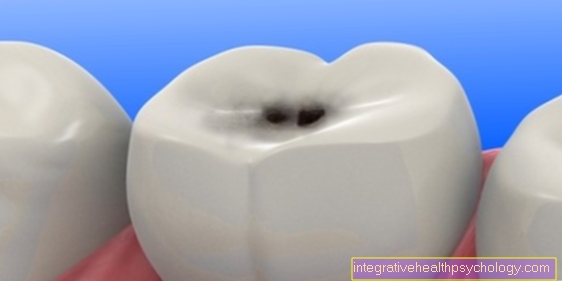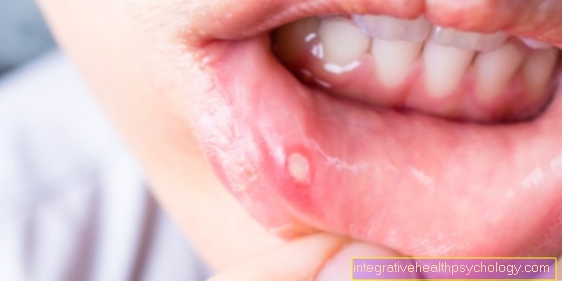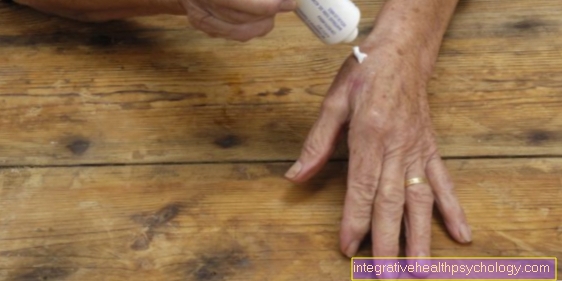Home remedies for salivary stones
introduction
A salivary stone can cause extremely uncomfortable discomfort and lead to severe pain when eating.The good news, however, is that sometimes you can remove a salivary stone yourself and you don't always have to see a doctor. A wide variety of home remedies are available for this to bring the stone into the daylight.

To prevent salivary stones, it is advisable to always drink sufficient amounts of fluids and to chew chewing gum or suck a candy more often. This keeps the system flowing and prevents the saliva from clumping into a stone.
Read more on the topic: Salivary stones
Which home remedies can help?
No matter which of the salivary glands the salivary stone is located in, there are various home remedies that can make the stone disappear again without having to go to the doctor.
- Massage the salivary gland
- sufficient amount of liquid
- Citric acid-containing foods are very good helpers. The acid can be administered in the form of candy, dental care chewing gum or drinks and then stimulates the production of saliva in the salivary glands. With a bit of luck, the saliva stone can be flushed out of the gland duct, which makes the symptoms disappear.
- Consumption of apple wedges or vegetable broth
- good oral hygiene
- Taking anti-inflammatory agents to prevent simultaneous bacterial inflammation of the salivary gland
- Rinses with chamomile tea or tea tree oil.
Also read the article on the topic: This is how you can effectively remove salivary stones
lemon
Before going to the doctor is necessary, you can try to remove a saliva stone yourself. The lemon has proven to be the most tried and tested product. This is a so-called "saliva loosener", which stimulates saliva production and builds up pressure behind the stone. This can ensure that the salivary stone is washed out.
In addition, the simultaneous massage of the salivary gland, which, together with an increased amount of saliva, has a good chance of success. However, this method only helps if the stone is not too big or is too deep. Even if the stone has already grown together with the glandular tissue, the lemon can no longer help. It is then advisable to see a doctor before the salivary gland becomes infected with purulent inflammation and then has to be partially or even completely removed.
onion
Even if the onion smells strongly and many do not tolerate its consumption well, the healing effects must not be ignored. It belongs in every medicine cabinet due to its easy availability. It is used in several forms, as onion juice, onion sachets, warmed up or simply in a salad. An onion bag should be used for salivary stones.
To do this, the onion is finely chopped and placed in a cotton cloth. The pack is then heated, placed on the affected area of the face and should then take effect for half an hour. This is how the anti-inflammatory effects can best unfold.
For more information, see Onion as a medicinal plant.
Bertram
Bertram is a composite plant whose roots were already used by Hildegard von Bingen. The tincture made with it was used for toothache, oral diseases and paralysis. It has a vitalising effect and the essential oils contained in this plant have a salivary effect. Similar to the lemon, you can create pressure behind the saliva stone and then flush it out. In addition, it is also used for stomach problems, heart problems, insomnia or bed-wetting.
chamomile
Even if the chamomile flower looks very similar to the Bertramp plant, they have very different modes of action. Chamomile has a typical smell, is rather mild in taste and has both disinfectant and anti-inflammatory effects. Due to these effects, it can be used very well in the oral cavity as a daily rinse for inflammation or open areas. If there is a salivary stone, the chamomile flush protects against inflammation of the gland and thus prevents the disease from worsening. There are also a number of other areas of application for the chamomile flower, such as sinus infections, sore throats or headaches.
For more information, see Chamomile as a medicinal plant.
horseradish
Even if many of them are often only familiar with its use in the form of food, horseradish also has great healing properties. It is used for infectious diseases and against pain. The effect unfolds best when the plant is freshly rubbed, as the sharp essential oils evaporate quickly. Like lemon, these have a salivary effect and also fight bacteria through their ingredients. An inflammation of the salivary gland is best prevented.
For more information, see Horseradish as a medicinal plant.
thyme
In addition to a wonderful taste component, thyme has a disinfectant effect and has an extremely strong effect on the respiratory system. This explains the frequent use for coughs or asthma. In addition, the bacteria-inhibiting effect should not be in the background, because this way inflammation of the gums can be effectively combated. This also explains the recommendation for taking salivary stones. An inflammation of the glands can be prevented in this way.























.jpg)





